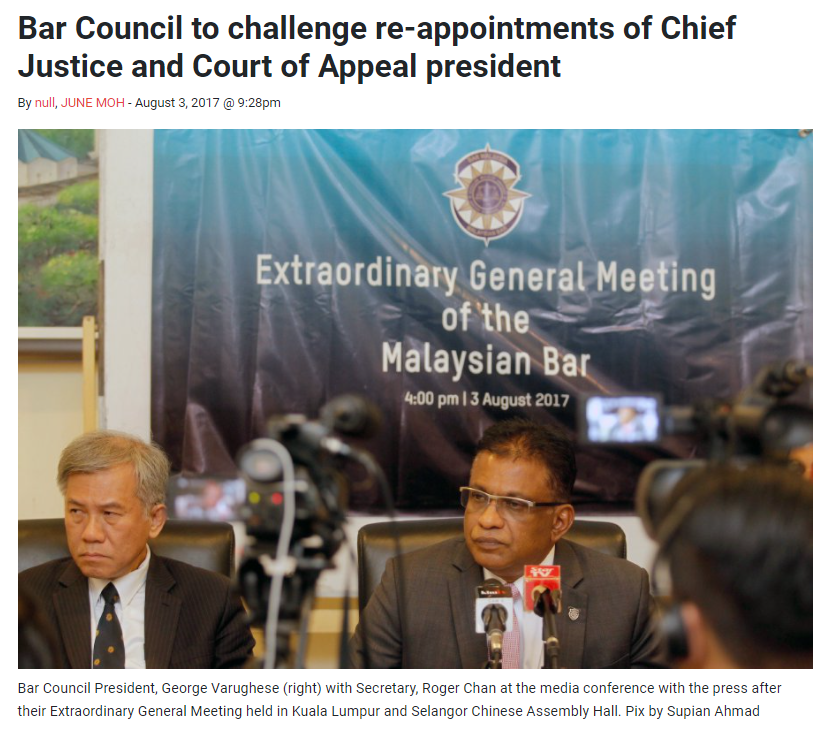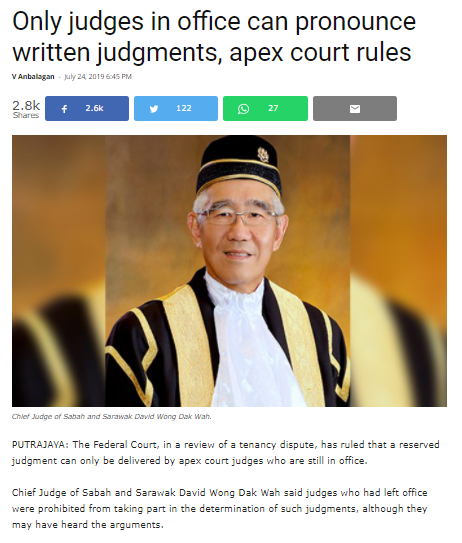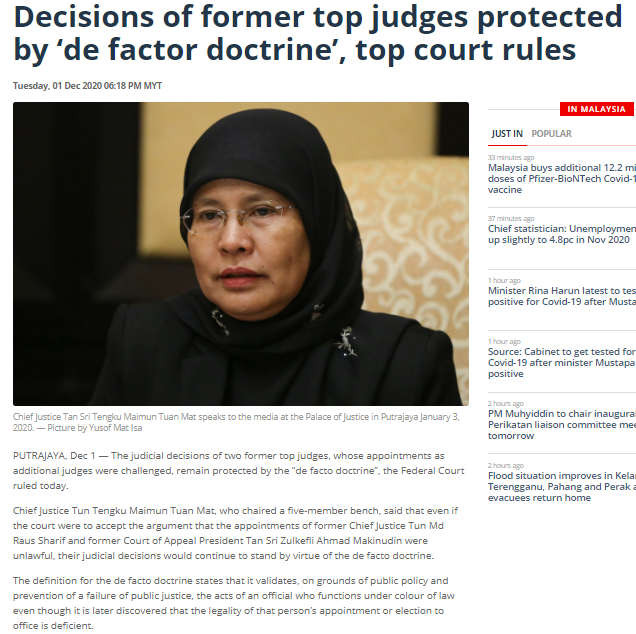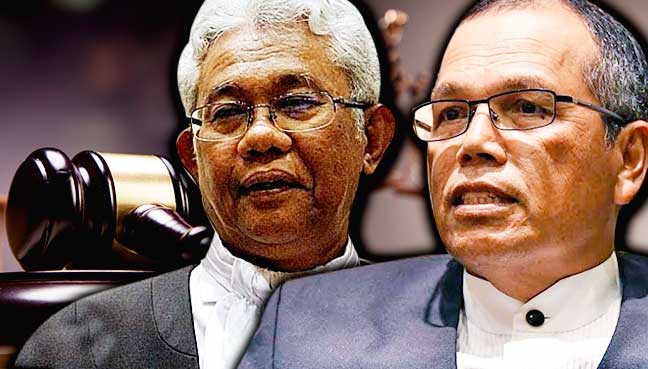Three years have passed since the controversial re-appointments of Tun Raus Sharif and Tan Sri Zulkefli Makinudin were thrust into public scrutiny. In 2017, the then Chief Justice and President of the Court of Appeal were appointed as additional judges in the Federal Court despite reaching the compulsory age of retirement encapsulated within Article 125(1) of the Federal Constitution (“FC”).
It was the advice of Tan Sri Arifin Zakaria that led to the reappointment of the two Judges. The purported appointments were sought to be justified under Article 122(1A) FC which states that the YDPA may, upon the Chief Justice’s advice, appoint any person who has held a high judicial office in Malaysia to be an additional judge of the Federal Court. This justification was met with widespread criticism. Legal action was also filed by the Malaysian Bar to challenge these appointments.
Under heavy flak, the two Judges resigned effectively on 31.7.2017.
The resignation of Tun Raus and Tan Sri Zulkefli had a lasting rippling effect within the legal arena. Although the passage of time has condemned this incident to brief obscurity, the recent decision of the Federal Court in Yong Tshu Khin v Dahan Cipta Sdn Bhd [2020] 1 LNS 1650 had thrusted this issue to the limelight once more.
Hence, this article shall discuss the precedential impact brought upon by the resignation of the two Judges.
A Burning Question Rendered Academic – The Bar Council’s Constitutional Challenge
The Bar Council initiated a constitutional challenge to the appointments of the two Judges in the High Court. Through s. 84 of the Courts of Judicature Act 1964 (“CJA”), the High Court referred the constitutional challenge to the Federal Court for determination. The reported FC decision may be found at Bar Council Malaysia v Tun Dato’ Seri Arifin bin Zakaria [2020] 4 MLJ 773].
The constitutional challenge was, inter alia, premised on the interpretation of Art. 122(1A) FC. However, the court directed counsels from both parties to clarify whether the matter has been rendered academic by the resignation of the two Judges on 31.7.2017. The Bar took the position that it was not rendered academic as the declarations sought concerns a ‘live issue’. The AGC naturally posited otherwise.
Hasan Lah FCJ, who delivered the majority judgment, acceded that the issues were public importance when it was raised. His Lordship then adopted the test stipulated in Datuk Syed Kechik v Board of Trustees [1997] 1 MLJ 257 to determine whether the issue was indeed academic. The test is as follows:
“The test therefore, in deciding whether an appeal has become academic is to determine whether there is in existence a matter in actual controversy between the parties which will affect them in some way. If the answer to the question is in the affirmative the appeal cannot be said to have become academic.”
His Lordship also considered the judgment of Lord Slynn of Hadley in R v Secretary of State for the Home Department ex p Salem [1999] AC 450, which provided the ‘public law exception’ that permits courts to entertain issues which no longer directly affect the rights and obligations of parties depending on the factual matrix of a certain case. Despite so doing, His Lordship opined that the current dispute does not fall within the public law exception. By so doing, the court skirted the thorny issue of constitutionality.
His Lordship then fell back on the general approach towards academic questions, albeit recognising earlier that there was room to deal with such questions if they have public importance. His Lordship did not attempt to deny the public importance of this question at any part of his judgment. Hence, by plain reliance on the resignation of the two Judges, the Federal Court swept the issue of constitutionality under the carpet and refused to place their former colleagues on the proverbial pillory of illegality.

The Ripples Felt – The Question of Corum Failure in Bellajade
In Bellajade v CME Group [2019] 8 CLJ 1, the Federal Court was dealt with the issue of corum failure that was caused by the resignation of Tan Sri Zulkefli. In this case, the Federal Court had heard the case and reserved judgment until 25.9.2018. During that period, the resignation of the two Judges took place. Then, Tan Sri Azahar Mohamed pronounced in court the written judgment authored by Tan Sri Zulkefli on his behalf. The judgment, being the sole composition and reasoning of Tan Sri Zulkefli, was concurred and adopted by three other judges, which then comprised the majority.
The judgment was contested by CME under Rule 137 of the Rules of Federal Court (RFC) which states the Federal Court’s inherent power to hear applications to prevent injustice. The judgment was argued to be inoperative due to corum failure, as it was pronounced in an open court only after Tan Sri Zulkefli’s resignation; him no longer an active member of the court
The court in Bellajade eventually ruled in favour of the appellants that there was corum failure. Relying upon the precedents of Chia Yan Teck v Ng Swee Kiat [2001] 4 MLJ and MGG Pillai v Tan Sri Dato Vincent Tan [2002] 2 MLJ 673, the Federal Court agreed that Tan Sri Zulkefli Ahmad Makinudin was clearly not in existence as a member of court during the pronouncement of judgment done on the 25th of September, considering he tendered his resignation to the YDPA before that. Since this judgment was relied upon by three other Federal Court judges, namely Tan Sri Zaharah Ibrahim CJM, Tan Sri Azahar bin Mohamed and Dato’ Balia Yusof, it is all the more important for Tan Sri Zulkefli to be in existence as a member of court. Therefore, the judgment authored by Tan Sri Zulkefli was inoperative when pronounced and the concurring judges were adopting an expired judgment that is void. The significance of this decision cannot be understated. This case delivers great impact on other ongoing cases which concern a judgment given by either Tun Raus Sharif or Tan Sri Zulkefli Makinudin. As Bellajade had established a precedent that the judgments of Tan Sri Zulkefli may be challenged for coram failure, it would resultantly open a floodgate of litigation for other cases in which judgments were pronounced after the resignation of the two Judges.

The Floodgates Realised – Yong Tshu Khin’s Case
There were 7 review motions filed according to rule 137 of the Rules of the Federal Court 1995. These motions were filed against the decisions of the Federal Court which quorums included either Tun Raus, Tan Sri Zulkefli, or both. These 7 motions were broken down into 4 sets: the Yakin Tenggara Motions, the Yong Tshu Khin Motions, the Tan Boon Lee Motions, and the Tan Wei Hong Motion.
A common ground advanced by all 7 motions was the argument of corum failure. It was argued that the appointments of Tun Raus and Tan Sri Zulkefli as Chief Justice and President of the Court of Appeal respectively were invalid due to a flawed construction of Article 122(1A) FC. It then follows that their invalid appointments would nullify the empaneling of the Federal Court quorum that heard the appeals and that the two Judges were not entitled to sit in these cases.
The attempts of the applicants to cement the illegality of the two Judges’ appointments were however barred by the de facto doctrine. The Federal Court, through Tengku Maimun CJ, held that the common argument advanced by the applicants amounted to a collateral attack. This is because the validity of the appointments of the two Judges was not raised during the hearing of the appeals proper. Therefore, as the de facto doctrine prohibits all forms of collateral attack on the validity of a judge’s appointment, these arguments bear no fruit.
It is also the premise of the de facto doctrine that even if a judge’s appointment was indeed found to be invalid, all decisions made by the impugned judge could not be nullified for practical expedience and the protection of public and private interest. If the invalidity of a judge’s appointment would nullify all judgments made during his tenure, then that would cause endless confusion and needless chaos. Whatever defect to the appointment of the incumbent judge, it is the colour of lawful authority that endows his office that matters, and not the incumbent.
Therefore, by virtue of the de facto doctrine, the common argument on corum failure was dismissed by the FC, and along with it, any attempt to reventilate the illegality of the two Judges’ appointments. The FC then proceeded to entertain the 4 sets of motions on their specific arguments.
For the Yakin Tenggara Motions, the challenge was mounted against the FC’s decision of 10.10.2018 which was authored by Tan Sri Zulkefli and pronounced by Balia Yusof FCJ. The applicants contended that Balia Yusof FCJ could not ‘adopt’ the judgment of Tan Sri Zulkefli who had already resigned at the date of pronouncement. Heavy reliance was placed on the dictum in Bellajade.
However, the FC distinguished Bellajade from the current challenge. In Bellajade, the attack was on the invalidity of the majority judgment. In this challenge, however, the impugned judgment was a minority judgment, and the majority judgment of three judges remain valid. By adopting a purposive interpretation of section 78(2) CJA, the FC held that the opinion of the dissenting judge is severable, thereby protecting the integrity of the majority judgment. As a minority judgment has no force of law and would not impact the majority’s findings, the Yakin Tenggara challenge was dismissed.
Next, the Yong Tshu Khin Motions. Here, the FC decision pronounced by Azahar Mohamed FCJ on 9.7.2018 was signed by Tun Raus. The thrust of the applicant’s argument was that Azahar FCJ’s conduct of delivering the judgment sitting alone was a violation of section 78(1) CJA, and that therefore the court was not duly constituted. The counsel argued that section 78(1) CJA stipulates that where a judge is ‘absent’, the proceedings can continue if the coram is not less than two. Hence Azahar FCJ, by delivering the judgment alone, violated said provision.
The FC also could not accede to this argument. It opined that a judgment may be pronounced in open court so long as the corum is properly constituted, despite an absent judge A corum is properly constituted so long as the judges involved remain ‘in legal existence’. If the corum is properly constituted, the judgment may be pronounced in the physical absence of that judge.
Therefore, the pronouncement of Tun Raus’ judgment by Azahar FCJ is justified because the four other judges in the panel remain in legal existence. The Yong Tshu Khin Motions were dismissed. Both the Tan Boon Lee and Tan Wei Hong motions have scant relation with the resignations of the two Judges, and shall therefore be omitted from this discussion.

Conclusion
Evidently, there are widespread repercussions when a judge is appointed via purportedly unconstitutional means. After their abrupt resignation, a constitutional challenge ensued, a panel which they delivered judgment for was invalidated for corum failure, and that then splintered to 7 more review motions which also alleged corum failure. Clearly, their resignation did not put an end to the controversy.
The recent application of the de facto doctrine on this issue is necessary to bar the floodgates of litigation, especially those seeking to attack the appointment of the two Judges collaterally. However, the doctrine does not have an impact on any other allegations of corum failure, especially since the precedent of Bellajade remains good law. Hence, it is hard to tell if Yong Tshu Khin shall be the last legal challenge that is premised on the resignation of Tun Raus and Tan Sri Zulkefli. There may be more of such cases waiting for their day in court, and it may catalyse further developments to the doctrine of corum failure.
Admittedly, even if the two appointments were held to be unconstitutional, this would not have a direct bearing as to whether a panel was nullified by coram failure or not, since the two Judges opted to resign anyway. However, the unanswered question of constitutionality remains highly unsatisfactory.
When an issue of constitutional interpretation relating to the Judicature arises, there is, without doubt, an element of public importance (R v Hinds [1977] AC 195). This, therefore, necessitates the litigation of the matter although it no longer has a direct impact on the parties involved, as envisaged in Salem. Hence, the FC’s reluctance to take the bull by its horns in the Bar Council challenge is, with respect, regrettable. The panel should not have wrung its hands when the constitutional challenge was indeed very ‘alive’ and very significant to the public at large. If it weren’t significant nor of public interest, there would not have been a flurry of legal challenges premised on the same issue.
Unless a review application is filed to revisit the Federal Court’s decision in the Bar Council’s constitutional challenge, the question of constitutionality cannot be revisited in other forums. This is the effect of the de facto doctrine in Yong Tshu Khin, where it prohibits any collateral attack on the appointment of judges unless they are named as a party to the suit, and also validates any acts of the said judge in its official capacity even if his appointment was subsequently nullified.
